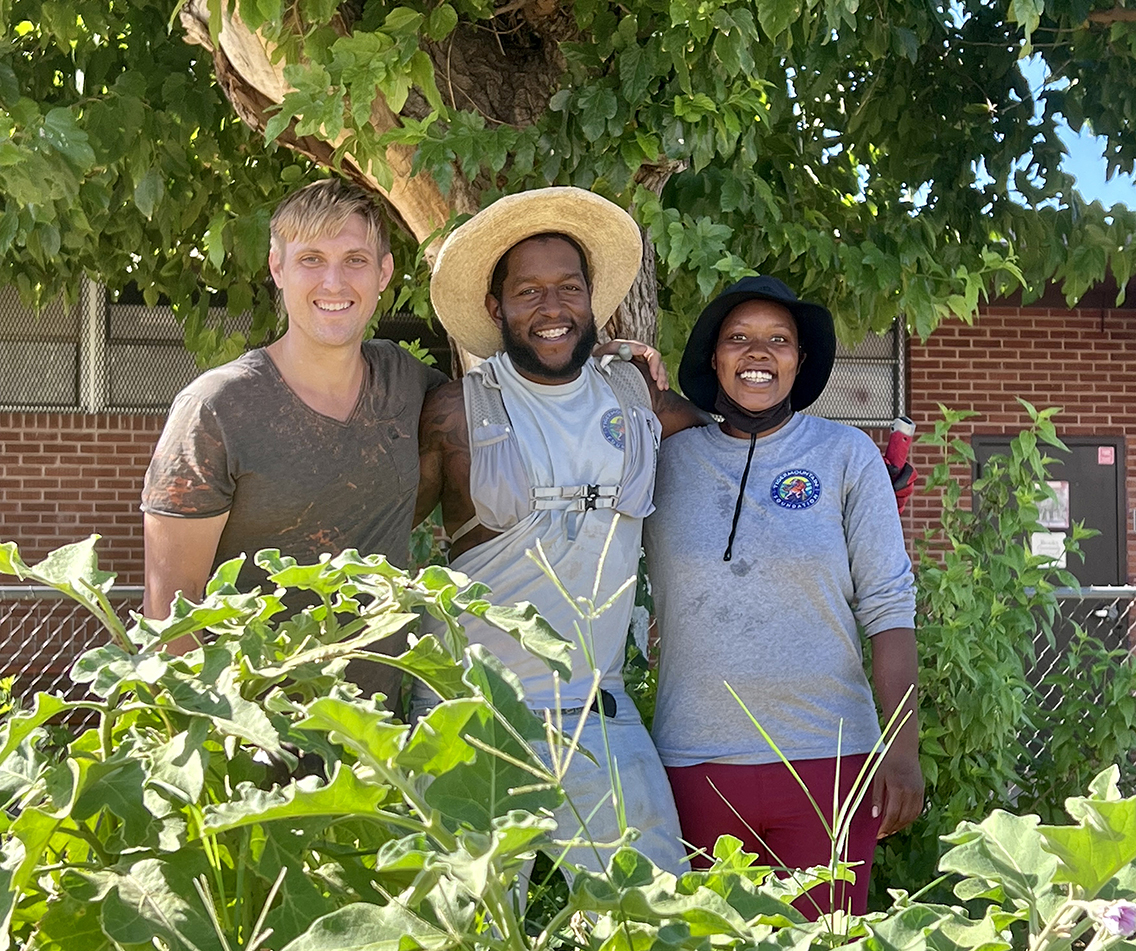TigerMountain Foundation
TigerMountain Foundation started with a boy in his grandparents’ garden in South Central Los Angeles. Their garden was healthy, lush and abundant with vegetables, berries, fruit trees and both edible and healing flowers. His grandparents traded with their neighbors and built community around the fruits of their labors.
Darren Chapman, future CEO of the TigerMountain Foundation, was the boy. “We ate well,” he recalls. “I was rich beyond belief. We had a monster avocado tree and on hot days I sat up in that tree and watched the world go by.” The boy was also rich beyond belief with safety, security, family, community, connection to nature, healthy food and exercise.
The neighborhood changed. Drugs, alcohol and gang violence moved in. Darren’s teacher told him that as a Black man he shouldn’t expect to live longer than 25 years. “I got sucked in, was behind bars and then homeless. I wanted to escape the pain and darkness, and I strove toward betterment. I decided I wanted to emulate my grandparents and started a community garden. I was inspired to uplift others using the garden as a tool.”
The healthy garden life became his salvation. “I learned the process and found when you plant and grow, things get better. Getting my hands in the dirt brought connection to who I really am.”
Darren Chapman started the TigerMountain Foundation 18 years ago in his Phoenix backyard. He set out to build a small garden project like grandma’s and it kept growing. Out of the backyard, he looked to restore abandoned dump sites and vacant lots. Now he manages four garden sites across South Phoenix, including the 19-acre Spaces of Opportunity Community Garden. With the help of other folks who had fallen on hard times, he has converted wasteland into food-producing beautiful green space.
The mission of TigerMountain Foundation is “to empower people by building flourishing community gardens, providing job skills, support and workforce development through neighborhood revitalization and beautification with our own multi-ethnic, multi-generational initiatives.”
Through grants, donations and partnerships TigerMountain has acquired the funds to train and employ garden workers and found resources for affordable housing, health care, workforce development, financial literacy, substance abuse awareness, entrepreneurship training and parenting support. TigerMountain establishes community around gardens with regular volunteer opportunities, celebrations, farmer and craft markets, youth projects and cooking classes. Formerly ugly and trashed spaces, these beautiful gardens now are focal points for the community.
As for the people, it all starts with hands-in-the-dirt garden work. New arrivals are offered garden employment, training and support. With the guidance of a mentor, each builds a plan with personal goals. Every garden session starts and ends with group sharing sessions—what you know, what you want to know, what you learned—building trust and community.
Rebuilding a productive life is a struggle but with each seed planted old habits are replaced with healthy alternatives. The garden grows and produces food. Success builds success with a sense of accomplishment, pride and positive purpose. Workers go on to become team leaders and help others. “I invest in people,” Darren says, “and I’m blessed to have influenced thousands of lives.”
Four Stories
Brooks Academy is the former Palmdale Elementary School repurposed as a focal point for community nonprofits. The TigerMountain Foundation rents a former classroom for its office and the TigerMountain/Brooks People’s Garden is just across the walkway. This is a USDA People’s Garden, described on the USDA website like so: “The People’s Garden community connects gardens across the country that produce local food, practice sustainability and bring people together in their community.”
On a hot day in late summer, I find four people in the garden, preparing for the upcoming desert growing season. They’re digging, sifting, pulling and chopping out a vigorous invasion of Bermuda grass. That, not the heat, is the struggle of the day.
Chance Morales meets me in the shade of a tree to take a break and tell me his story. He’s a garden lead and irrigation tech advisor. Blond, smiling and confident, he tells me how he struggled with illness, dementia and death in his family. He lost his job and fell into depression, then turned to drugs and became homeless. His cousin offered a living space but then Chance developed anxiety and agoraphobia, gained 100 pounds and went to therapy, where he was prescribed a load of medications, none of which helped.
Then he found TigerMountain. He got his hands in the dirt and fell in love with the work. “It was the first time I touched a plant in years,” he recalls. “I learned how to be a person again, how to love myself, how to have goals. Two years later, I am in a strong personal relationship, I have garden planning and irrigation jobs, and I am helping my girlfriend start a healing herb business.”
I talk to Yvonne Junniel, on a break from wrestling with Bermuda grass. She was trapped in an alcoholic, drugged and discouraged life. She says, “One day I was walking by the garden with a beer can. I was curious and I was tired of the same old dead end. Darren Chapman gave me his business card. I called him and he offered me a job! The garden is food for my soul. This program had a huge impact. It gave me something to do around loving, caring people.” She doesn’t have future plans yet, but she’s gaining confidence and thinking about it. She leaves and goes back to work on the Bermuda grass.
Rodney Smith is the lead gardener. I met him several months before on another TigerMountain site, the Garden of Tomorrow. He describes his first experience with TigerMountain: “I just wandered in. I was out of jail and on the streets. Now I’m two years sober and have real positive direction in my life.” His goal is to start a healthy-food, plant-based restaurant. TigerMountain Foundation has helped him with financial and business literacy and food service training. He’s working out of the Brooks Academy kitchen. He’s signing contracts and teaching classes. “I’m excited,” he says, “but I’m not leaving the garden, because I love it.”
Adrian Myint waits quietly in the background while I talk to the others and then takes me for a tour of the property. During Covid he rented a 5- by 50-foot garden bed in Spaces of Opportunity. He says, “I had no farming experience. The garden manager trained me. He gave me several native I’itoi onions to plant and they turned into hundreds. That was my graduation. I was then hired as a garden team leader.”
Each of these four working gardeners has learned life and practical skills that will pay dividends for years to come, be it in the garden, a kitchen, a new profession, or with relating to others the community.
What Is TigerMountain?
I asked everyone that question. They all had different stories that begin with the same boy: Darren Chapman. As the garden crew at TigerMountain/Brooks People’s Garden returns to doing battle with the Bermuda grass, I see TigerMountain this way: The tiger embodies ferocity and the will to persevere through tough times. The mountain represents challenges in life and in the garden. For the garden, today’s challenge is Bermuda grass. For life in Phoenix, the challenge is one of the highest recidivism rates in the nation. TigerMountain is changing that. According to the website “TigerMountain participants enjoy an 85% rate of NOT returning to jail or entering the justice system in the first place.”






